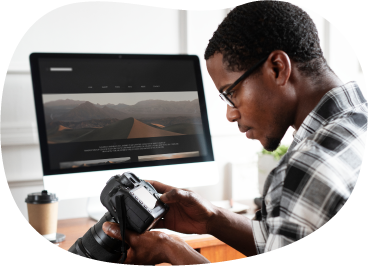For a profitable photography business, focus on expenses

Professional photographers have their work cut out for them. In a field where 85% don't last three years, it's crucial to step back and take a hard look at the numbers.
First, you need to track how much you're spending, if you're not already doing so. Evaluate each new piece of equipment or expenditure to make sure it's worth the cost.
Second, look at your profits. How many gigs do you need to break even with your spending, and how many more will help you attain your business goals?
Finally, it's important to protect yourself against common risks. A single lawsuit could bankrupt a freelance photographer, which is why you need to invest in business insurance.
Here's a quick breakdown of the factors that can help your business thrive despite the odds.

How much is your business costing you?
Chances are you didn't buy all your photography essentials in one fell swoop. Like other self-employed photographers, you probably acquired your equipment piece by piece over time, and you may still be saving up for that new lens.
There's nothing wrong with that, but it's important not to lose track of how much you've invested (and continue investing) to keep your business operational. Turns out, all those bit-by-bit expenses add up to a small fortune.
For example, you can expect to pay between $13,000 and $17,000 to start a wedding photography business, or between $8,000 and $13,000 to get off the ground as a portrait photographer.
It's important to track one-time purchases, such as a new camera, as well as monthly fixed expenses, like rent on a photo studio, which can easily add up to $3,000 per month. Once you know how much you're spending, it's time to find out what you're earning and how much work is ahead of you to reach your goals.
How much do photographers make?
You love your craft, but to do it for a living, you need to make money. By setting reasonable goals for earnings, you can figure out how many clients you need to bring in. Let's take a look at the numbers.
A wedding photographer makes between $2,000 and $3,000 for a one-day photography package. That means you'd need to shoot about a half dozen weddings to recoup what it costs to start your business, and one wedding per month to cover fixed expenses. It'll take about 20 weddings per year to earn $48,210, which is the national average salary for photographers according to the U.S. Bureau of Labor Statistics.
What salary would you like to see yourself earning? Take into account factors such as your expenses and cost of living. Divide that into monthly goals, then do the math to figure out exactly how much work you need to do to bring that in. If you come up short, you may need to increase your pricing, or put effort into social media marketing to find new clients.
What else affects a photographer's salary?
The salary range for photographers varies significantly. For instance, Salary.com reports a median salary of $59,082 for "Photographer I" and $70,828 for "Photographer II," which typically requires a bachelor's degree.
In short, a beginner can’t expect to earn as much as an experienced photographer right out of the gate. Along with education, your location on the pay scale depends on years of experience, any certifications, and the type of photography you do.
Finding full-time work can be challenging for photographers. It may help to expand your offerings or explore similar types of work, such as becoming a photojournalist, fashion photographer, product photographer, or even a graphic designer who sells high-quality stock images on the side.
Though you may need to explore photography jobs outside your specialty, this could buy you time to build up clients in the area where you really want to focus.
Why is business insurance important for photographers?
When you're having trouble balancing your budget, it's easy to see business insurance as an unnecessary expense. However, that's when insurance is even more important, as a single lawsuit or accident can send you into bankruptcy.
Here are the most important types of insurance for photography-based businesses:
General liability insurance
General liability insurance covers costs if a client trips on a light stand at your studio and breaks a wrist, or if you accidentally break a valuable item at a wedding or photo shoot.
Business owner's policy
A business owner's policy, or BOP, is the ideal package for photographers looking to save money. It combines general liability coverage with commercial property insurance at a discount.
Professional liability insurance
Professional liability insurance is crucial for photographers who could be hit with a lawsuit related to the quality of their work. It'll cover costs if a bride or groom sues for misplaced wedding photos, or if the results of a photo shoot don't match a client's expectations. You might also see this policy referred to as errors and omissions insurance (E&O).

Workers' compensation insurance
Workers' compensation insurance helps cover medical costs if you or an employee gets injured on the job.
This policy is often needed to comply with state laws. For example, photographers in New York and California need to carry this coverage as soon as they hire their first employee.
Commercial auto insurance
Commercial auto insurance covers costs if you get into an accident while driving for work. Most states require this coverage for vehicles owned by a business. If you drive your own car to photo shoots, or rent a van to transport photo equipment or drones, you can opt for hired and non-owned auto insurance (HNOA) instead.
Remember, your personal auto insurance won't cover work-related accidents, which is why you may need additional coverage.
Equipment insurance
Equipment insurance (also known as inland marine) protects your photography gear wherever you take it, and will pay for repair or replacement of damaged or stolen items. Commercial property insurance covers business property at a fixed location, which is why you may need additional coverage for cameras and other items taken to photo shoots.
Find quotes from trusted carriers with Insureon
Complete Insureon’s easy online application today to compare insurance quotes from top-rated U.S. carriers. Once you find the right policy for your small business, you can begin coverage in less than 24 hours.
Christine Aebischer, Contributing Writer
Christine is a contributing writer who's experienced in a wide range of topics from personal finance and insurance to luxury lifestyles and wellness. She is an accomplished writer, editor, and content marketer with a specialization in service-driven content.









